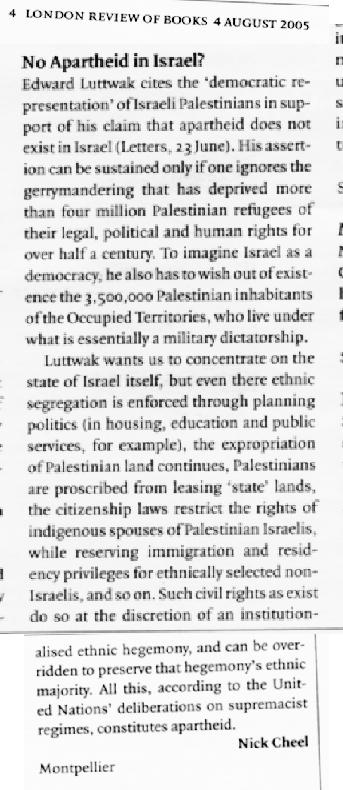From Nick Cheel
Montpellier
[original version, July 2005]; (right) as published 4 August 2005:
Edward Luttwak writes, in response to Ilan Pappe, of the "substantive importance" of "democratic representation" of Israeli Palestinians to claim that apartheid does not exist in Israel ('No Apartheid in Israel', LRB 23 June 2005). Self-evidently, his assertion depends on the 'gerrymandering' - and this is a euphemism for a 'Group Area Act' par excellence - that has deprived over four million Palestinian refugees of their legal, political and human rights for over half a century.
To preserve the democratic eulogy, we also need to wish out of existence the three-and-a-half million Palestinian inhabitants of the occupied territories, whose polity - or such part that is left to them after illegal appropriation for Israeli settlement - can only be categorised as arbitrary military dictatorship. The martial law applied to the OPT, as Archbishop Tutu has famously remarked, is more exclusionary and brutal than that experienced in apartheid South Africa.
Luttwak wants us to concentrate on the state of Israel itself, where civil rights as understood in the West exist to differing degrees a priori, but in practice there is a different story to tell. Ethnic segregation is enforced through planning politics (in housing, education and public services, for example); perennial expropriation of Palestinian land is ongoing; Palestinians are proscribed from leasing 'state' lands; citizenship laws restrict rights of indigenous spouses of Palestinian Israelis, while reserving full immigration and residency privileges for ethnically-selected non-Israelis ... and so on. The pervasive theme is clear: such rights as exist do so at the discretion of an institutionalised ethnic hegemony, provided that they may be overridden to preserve that hegemony's ethnic, arithmetic majority.
It is doubtful that many would agree that democracy has evolved as a political system of popular preference to be applied in this way. In any case, the foregoing, under United Nations' deliberations on supremacist regimes, constitutes apartheid.

 LRB 4 August 2005
LRB 4 August 2005
